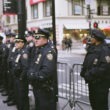The Fourth Amendment Vindicated—If the Al-Haramain v. Obama case had been a prize fight, the judge would have stopped it two years ago, when it was still styled Al-Haramain v. Bush. It has long been evident that the plaintiffs were subjected to wiretapping. It was also evident that if there had been a warrant for the surveillance, the government would have produced it and mooted the case.
Since the suit was filed in 2006, the claim by the Al-Haramain Islamic Foundation of Oregon that its attorneys in Washington, D.C., had been subjected to warrantless surveillance pivoted on one document. In 2004, the Treasury Department inadvertently mailed to Al-Haramain’s legal team documents that established that telephone calls between Al-Haramain’s Washington, D.C., attorneys and Al-Haramain associates outside the country had been wiretapped. Justice Department lawyers succeeded in keeping the document not only out of the court record but sequestered. (The copies and photocopies that the plaintiffs and their attorneys had seen had been retrieved by the government.)
Despite the fact that two of Al-Haramain’s lawyers had seen the sequestered document, they were confronted with a Hobson’s Choice: prove that their clients had been subjected to wiretapping without the proof. Al-Haramain attorney Jon Eisenberg did just that, mining the public record to produce enough evidence to convince the judge that Al-Haramain had been subjected to warrantless surveillance. (See Washington Spectator issues 10/1/07, 2/1/09, 3/15/09, 7/1/09, and 10/15/09.) On March 31, federal District Judge Vaughn R. Walker, who had been appointed by George H.W. Bush, declared that Eisenberg had proved his case.
“Plaintiffs must—and have—put forward enough evidence to establish a prima facie case that they were subjected to warrantless electronic surveillance,” Walker wrote in a 45-page opinion that dismantled the government’s defense of the since-suspended surveillance program.
Walker wrote that attorneys from the Justice Department failed to meet their burden of proof that the government had a warrant when it listened in on conversations between Al-Haramain board members in the Middle East and their attorneys in Washington, D.C. The DOJ legal team also failed to establish that the wiretapping program they were defending (without admitting it existed) was legal. Walker also ruled that the government can no longer invoke the State Secrets Privilege to hide activity that comes under the purview of the Foreign Intelligence Surveillance Act.
Executive branch officials, the judge wrote, have abused the State Secrets Privilege to evade FISA, which Congress had passed in 1978 to create a judicial check on surveillance conducted by the executive branch. The judge pointed to evidence gathered by a House committee that “establishes the inappropriateness of relying solely on the executive branch to safeguard our civil liberties.”
The Bush-Cheney warrantless surveillance program was on trial and it lost. Congress had created a process that authorized judges sitting on a secret FISA Court to issue warrants up to 72 hours after surveillance begins, which judges routinely issued. The Bush administration flouted the courts and the Congress and conducted surveillance without warrants. Judge Walker called their hand.
This was an important decision. There have been other challenges to the wiretapping program, but none of the plaintiffs had proof to establish standing. As plaintiff’s attorney Jon Eisenberg has said, this case was also a challenge to the unitary executive theory by which Bush and Cheney vastly expanded the authority of the executive branch.
Litigating this critical issue would not have been possible if James Risen hadn’t reported in the New York Times in 2005 that the warrantless wiretap program existed. Nor would it have advanced without the agility of Portland lawyer Tom Nelson, who read Risen’s reporting and immediately realized that the document he had seen as part of the Al-Haramain case was proof of wiretapping. Had district Judge Garr King in Portland, Oregon (where the suit was filed), capitulated to federal marshals who threatened to enter his chambers to retrieve the surveillance document, the case probably would have ended there.
Attorney General Eric Holder continued the defense of an illegal and unconstitutional program. Holder and Obama now face the prospect of creating bad case law if they appeal and the Roberts Supreme Court overturns Judge Walker’s decision, reaffirming the expansive presidential powers envisioned by Dick Cheney and George W. Bush.





0 Comments